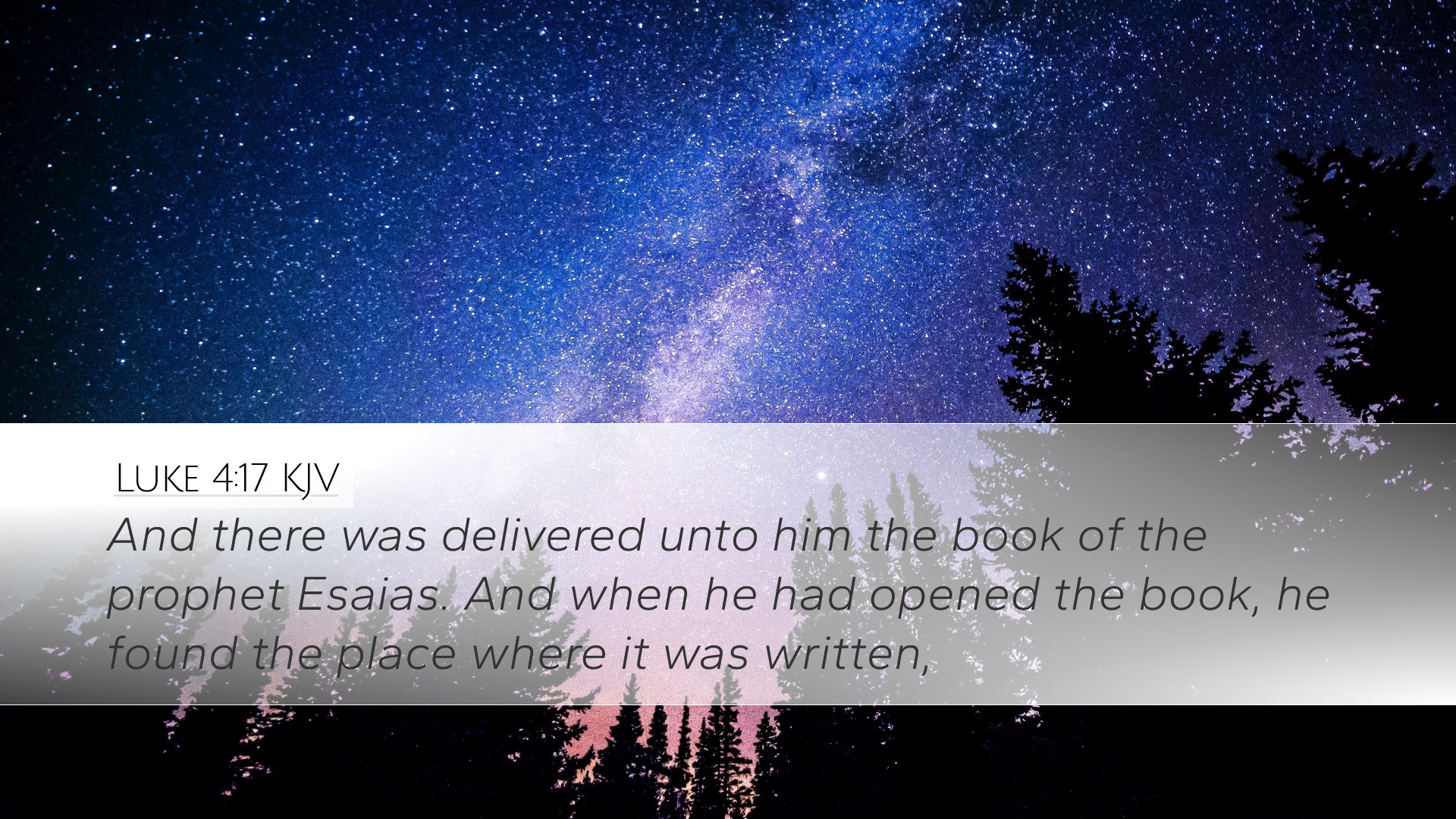Commentary on Luke 4:17
In Luke 4:17, we find a significant moment in the ministry of Jesus that illustrates His identity and mission. This verse states:
"And there was delivered unto him the book of the prophet Esaias. And when he had opened the book, he found the place where it was written."
Contextual Background
To grasp the depth of this verse, it is essential to consider its context within the Gospel of Luke. Jesus returns to Galilee after His baptism and temptation in the wilderness and begins teaching in the synagogues. His reputation as a teacher begins to grow, setting the stage for the significant revelation that follows in this passage.
Insights from Matthew Henry
Matthew Henry emphasizes the profound significance of Jesus reading from the scroll of Isaiah. He notes that:
- Fulfillment of Prophecy: The selection of Isaiah's text serves as a clear statement of fulfillment, indicating that Jesus is the messianic figure foretold by the prophets.
- Divine Authority: By reading the text, Jesus implicitly claims divine authority. In this act, He reveals both His mission and the nature of His ministry.
- The Seriousness of His Mission: Henry also highlights the somber yet hopeful nature of the message contained within Isaiah’s words, that Jesus came to bring good news to the poor, heal the brokenhearted, and proclaim liberty to the captives.
Reflections from Albert Barnes
Albert Barnes provides a detailed examination of the passage, focusing on the implications of “the book” being handed to Jesus. Barnes notes:
- Historical Context: The scroll Jesus read was likely a regular part of synagogue readings. This choice demonstrates Jesus' deep engagement with Jewish tradition.
- Messianic Mission: Barnes underscores that the verses Jesus read from Isaiah 61 reflect the compassionate and liberating essence of His mission, affirmed by the anointing of the Spirit.
- Human Experience: Barnes points out that Jesus' focus on the marginalized reflects a shift in understanding divine favor, which was often seen in terms of wealth and power.
Insights from Adam Clarke
Adam Clarke offers a rich theological perspective on the verse, providing additional layers of meaning:
- Isaiah’s Text as Prophetic Vision: Clarke elaborates that the prophecy cited by Jesus outlines not merely His mission, but the overarching purpose of God to bring restoration and hope to humanity.
- Spiritual Anointing: Clarke emphasizes the significance of being “anointed” – signifying empowerment by the Holy Spirit to execute the divine plan effectively.
- Call to Action for Believers: Through examining Christ's actions, Clarke challenges modern believers to embody the principles of justice, mercy, and service in their lives.
Theological Implications
The reading of Isaiah in Luke 4:17 is not merely an ancient practice; it invites us to consider the relevance of this message today:
- Jesus as the Fulfillment: The emphasis on fulfillment of prophecy invites leaders and congregants to contemplate how Jesus embodies the Torah and the prophetic teachings.
- Ministry of Compassion: The role of the church is to continue the ministry of compassion, aligning with Jesus’ mission by serving the poor, healing the broken, and advocating for freedom.
- Spiritual Legacy: As the heirs of this mission, believers are called to remain vigilant and active in promoting justice and mercy in their communities, reflecting Christ’s love and truth.
Conclusion
In conclusion, Luke 4:17 offers a profound text that encapsulates the essence of Jesus’ mission and the comprehensive nature of the Gospel. By engaging with insights from Matthew Henry, Albert Barnes, and Adam Clarke, pastors, students, theologians, and Bible scholars can derive a richer understanding of how this verse speaks not only to the first-century audience but resonates with the ongoing call for the church today.


